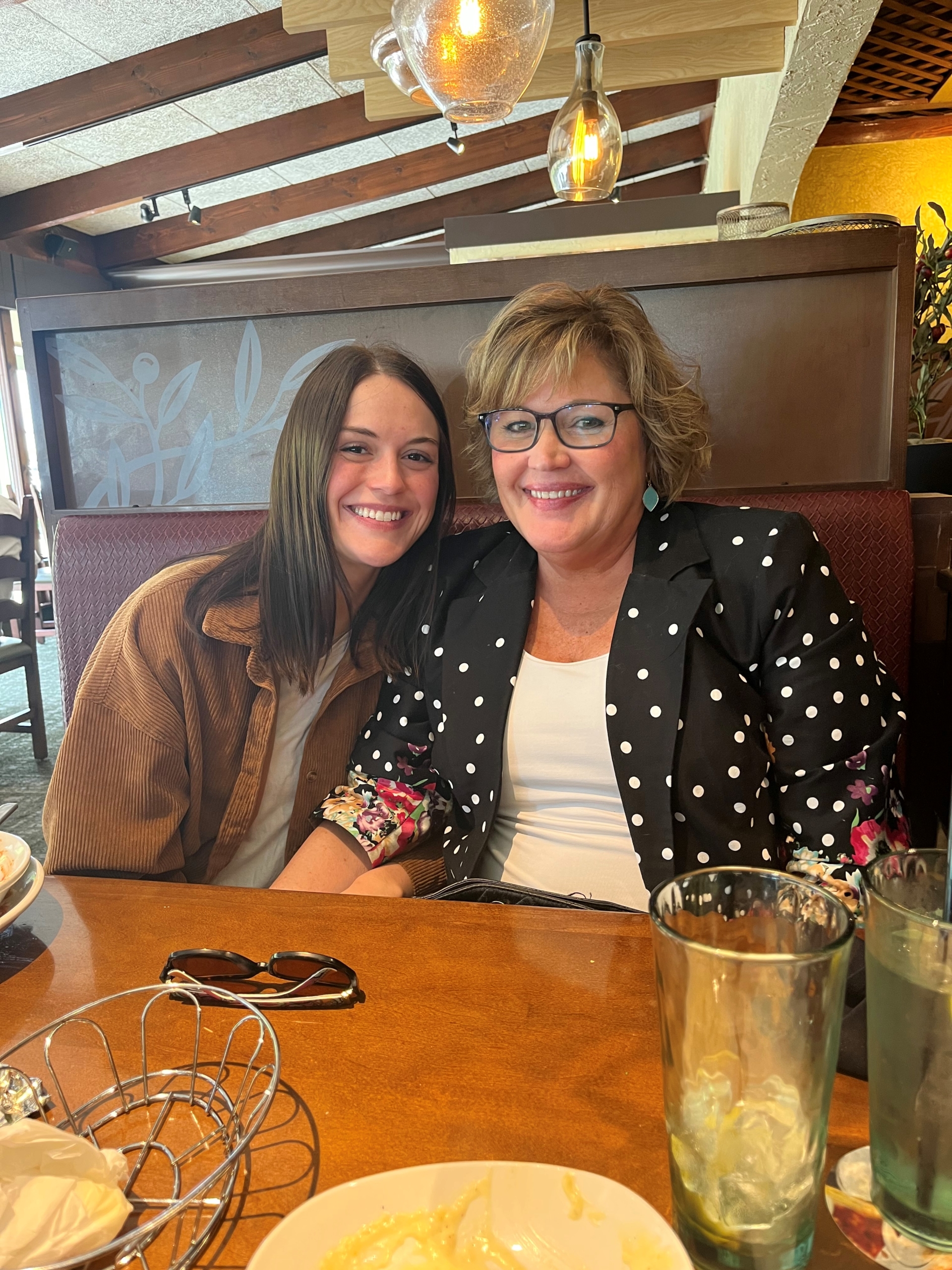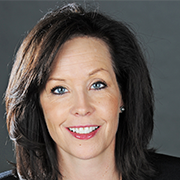Jan: Monica and Marianne, thanks for taking time out of your busy schedules to chat with The Veritext Voice! I appreciate you!
Monica: No problem at all.
Marianne: Happy to!
Jan: Ladies, you are a mother-daughter dynamic reporting duo out of Ohio. Which of our offices do you mainly work out of?
Monica: We work out of the Midwest Region at what used to be Mike Mobley Reporting, and our coverage area is primarily Dayton-Columbus-Cincinnati.
Jan: I’ve worked with Todd Mobley and his firm for decades, and one thing I know for sure is Todd always has top-notch reporters. So that tells me something about you right out of the gate!
Monica: Thanks. It’s been a great firm to work with.
Jan: Knowing a court reporter, or seeing one in action, seems to be one of the biggest influencers in bringing new people into “The Best Career You Never Heard Of.” I’m assuming that’s how you, Marianne, became interested in the profession?
Marianne: Yes, I grew up watching my mom work and listening to my mom talk about her role as a court reporter… and now I am one as well!
Jan: I think that’s fantastic. Keep it in the family! Monica, what about you? What led you to this profession, and how long have you been at it?
Monica: I took business courses while in high school, and one day we had a guest speaker come into our classroom to talk about court reporting. That’s when I decided I wanted to be a court reporter. My first day on the job was as an official court reporter right out of college–March 26, 1990. I’m now in my 32nd year, and today I am a freelancer.
Jan: Time flies, doesn’t it? I’m at Year 41, but it sure doesn’t feel like it. Marianne, did your mom out-and-out hustle you into the profession? Or as a kid did you try out her steno machine and start thinking maybe one day you’d give it a try? Or did life’s circumstances kind of lead you to court reporting’s door? How did you find your way onto this career path?
Marianne: It was really more life’s circumstances. I graduated in 2020 and worked in logistics sales my first year out of college, and I quickly realized that wasn’t for me. As I was pondering other career options, I became aware of the opportunity to become a digital court reporter, which also meant I could work at the same company as my mom. So I went through the program, graduated, and started reporting in January of this year; January of 2022.
Jan: How helpful has it been to have your mom as a mentor and an advisor as you embark on this new career?
Marianne: It is extremely helpful. She helps me with all kinds of things, big and small. I run spellings by her that I am having a hard time with; she instructs me on where it’s best to park and enter buildings when I have in-person jobs downtown. Things like that. She’s been just about everywhere, she’s done just about everything, and she knows so much about the role of the reporter and about all the area law firms that I just continue to learn from her every day.
Jan: Soak it all in! Your mom will continue to be a wealth of information and knowledge to you for a very long time.
Marianne: I’m very grateful for that.
Jan: So, tell me, ladies—what’s your favorite thing about being a court reporter?
Monica: My favorite thing about being a court reporter is all the fascinating things you hear and learn. For instance, I could put a new roof on your house, and I could also repair your abdominal aortic aneurysm. Just kidding! But seriously, you get to hear the most interesting things, the most boring things, and sometimes the most awful things you could ever want to hear. As an Official, I reported murder trials, rape trials, and everything in between. Now that I’m freelancing, all of my work is in civil litigation, but it’s still interesting. Every day is something new and different.
Marianne: My favorite thing about court reporting is learning something new every day. I have already learned so much in this role just since January! I also really enjoy the flexibility and the ability we have to work from home.
Jan: I think we’re all really loving the hybrid work-from-home model—one of the good things that came out of an awful pandemic.
Monica, you’re a steno reporter; Marianne, you’re a digital reporter. What sorts of considerations went into your decision, Marianne, with regard to which method of capture you would learn when you decided you wanted to follow in your mother’s footsteps?
Marianne: I chose digital reporting because the timeline towards the finish line was shorter than pursuing stenographic reporting. The DR program consists of online training courses that took a few weeks to complete. After that, you are required to shadow a reporter for several jobs, and then I was on my way!
Jan: No question that mastering stenography takes more time, and also no question that this industry needs each and every high-quality reporter out in the field just as soon as we can get them out here with us. Definitely a personal choice to be made based upon one’s individual strengths as well as financial and life circumstances.
Speaking of … Monica, I know you’ve been a proud stenographer for a long time. What have you learned from watching your daughter join the ranks of this noble profession using a different methodology? Are there any significant differences in the way the two of you do your job that you can comment on?
Monica: Well, I think stenographic court reporting is more of a contact sport! There’s just a lot of wear and tear on the body from the way we do our job. After reporting for 32 years, I now have two frozen shoulders. But I love court reporting, and now seeing how Marianne’s methodology works, if I ever feel like stenographic reporting is physically just too much, I will definitely consider transitioning into the DR arena.
Jan: You make a good point, Monica. Stenography is pretty physically taxing and definitely takes its toll on the ol’ bod over time. Transitioning could be a way to extend your career…and also help with the reporter shortage by staying in the industry when “the spirit is willing but the limbs are not”!
Monica: It will be nice to have that option.
Jan: You’d have a built-in technology mentor if you end up going that route. You know, what goes around comes around, Marianne!
Monica: Exactly.
Jan: Have you ladies been able to do things in tandem yet–attend court reporting conferences, or scope or proofread for the other, or relieve the other at a job, or sub out at the last minute? Anything like that?
Monica: We haven’t yet, but we are looking forward to doing just that. A fun mother/daughter trip to a conference is definitely in the works!
Jan: That would be super fun. Roomies!
Marianne: Yes!
Jan: Marianne, as a newer reporter, what’s been the biggest surprise/challenge so far?
Marianne: The biggest challenge so far has been learning how depositions are run; you know, all the various nuances, as well as seeing how attorneys speak to each other–and to you. I would say I am more introverted, so speaking up at certain times and knowing when to do so has been a bit challenging.
Jan: That is always a challenge, Marianne, for new reporters, and it’s probably one of the more important soft skills a reporter will need to master: When and how to interrupt proceedings. In my 28 years of agency ownership experience, the most common complaint I received about reporters, no matter how many certifications they held or did not hold, was the frequency and/or the way in which they interrupted the parties. Not so much the witnesses, but the attorneys. But it will get easier with experience…and unfortunately, you’ll get lots of experience.
Monica, as a seasoned veteran, what’s the best advice you have given your daughter as she launched her career as a court reporter?
Monica: Be assertive in a deposition. You belong there, and don’t let anyone tell you differently.
Jan: Great advice. I second it, and I love it! Monica, I can tell you want to say something. Go for it!
Monica: I just want to say that, while I admit to being a bit biased, I’m very proud of Marianne and her work ethic. The job of a court reporter is not easy, and learning to be one is not easy, regardless of which methodology you choose, and she’s doing great. I can see how she can take a career in digital reporting very far. Marianne also has a degree in marketing, so it’s easy to see how she could leverage that in her court reporting career at some point. Starting on the ground floor and learning all aspects of court reporting will make her a great leader in the profession.
Jan: I agree! This industry is going to need great future leaders, so if I may give you one piece of advice, Marianne, it would be to get involved early and serve your professional associations at both the state and national level. You’ll make wonderful lifelong friends, you’ll learn a ton, and that’s where all future leaders in our profession are born. These associations benefit greatly from new and energetic reporters as much as you’ll benefit from all the different experiences.
Marianne: Thank you. I’ll look into that.
Jan: Monica, we talked about you possibly ending your reporting career using digital capture if your shoulders give out. Marianne, have you ever given thought to learning stenography while working as a DR? I’m hearing that more and more—that steno students are using DR to pay for reporting school while learning the ropes. That would be crazy if you two ended up swapping methodologies someday.
Marianne: You never know!
Jan: Ladies, regardless of where your reporting paths take you going forward, all of us here at Veritext wish you the very best in this wonderful career, and we also thank you so much for chatting with us today. Take care!
Marianne: Thank you, Jan.
Monica: Thanks for having us.













